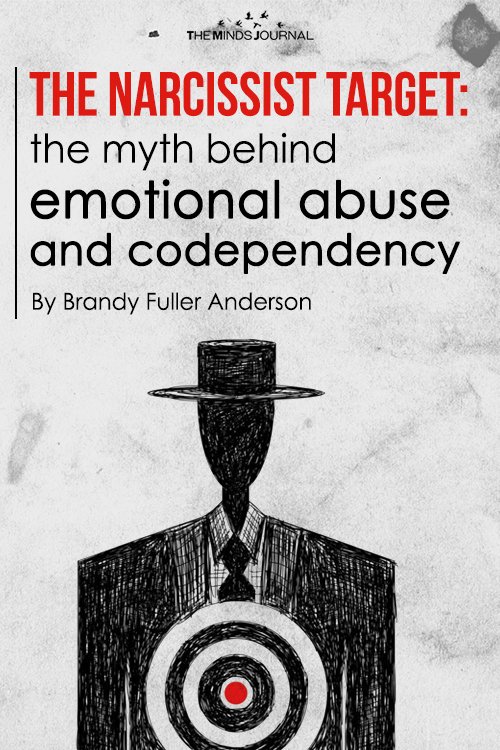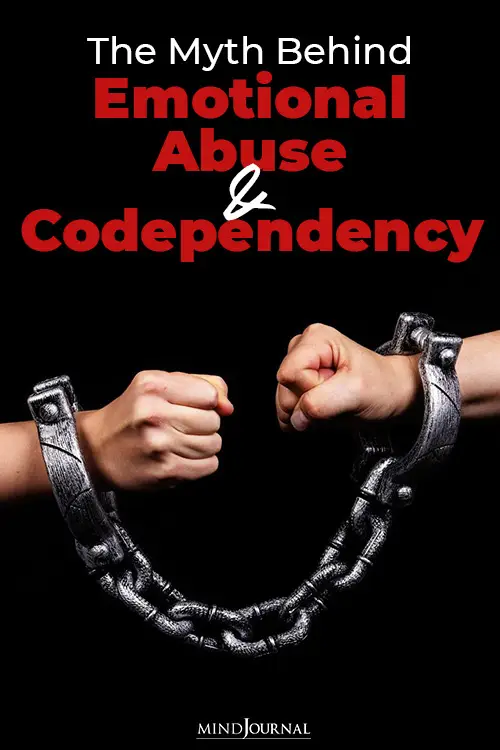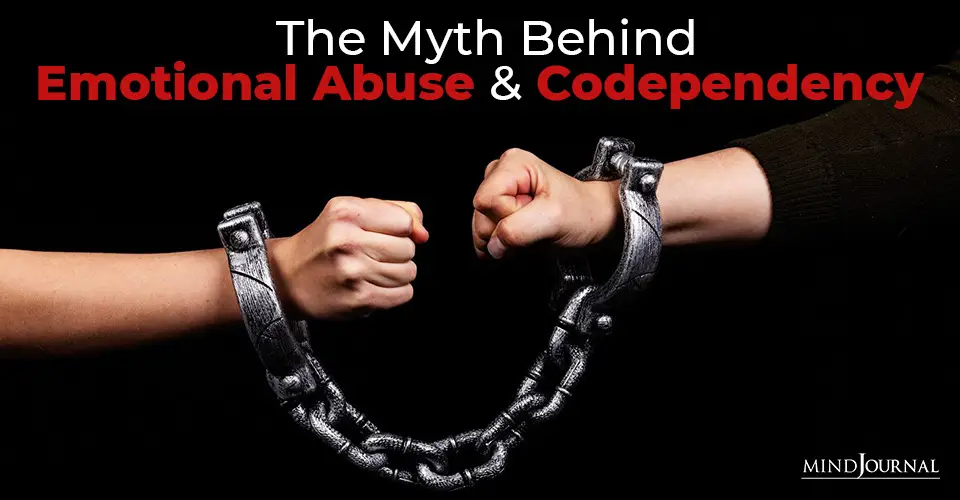Narcissists and Codependents go hand-in-hand, right? It’s written on multiple blogs, social media platforms, and even in self-help books. But would more narcissistic abuse survivors be insulted by these statements if they were hearing them before the emotional abuse disquieted their sense of self? Here’s the myth behind emotional abuse and codependency.
The term codependency represents a dysfunctional relationship paradigm in which one partner helps to enable the negative behaviors of the other, usually supporting their continued addictions, immaturity or other self-destructive behaviors.
What it insinuates is that the enabling partner is a willing participant, lacks a healthy sense of identity, an absence of confidence in their ability to thrive on their own, and a need to be needed at all costs. It has been rumored to be linked to a childhood trauma or unhealthy parental relationship, low self-esteem, and even a malfunctioning of their very core being.

However, with narcissistic relationships, codependency much less describes the individual characteristic of the targeted victim and is more so descriptive of the phenomenon created at some point in the courtship, in which the framework shifts to one in which one partner is displaying poor decision making and acting out, and the other partner is enabling such behavior. But would this term still be accurate if the enabling partner was unaware of the paradigm shift?
Emotional abuse and codependency
Victims of narcissistic abuse may be emotionally dependent, may have experienced a childhood trauma that disabled their flight response, they may have zero sense of their own self-worth…or they could be none of those things.
The one thing they will all have in common is that they were duped by a charming individual who was skilled at transferring their maladaptive thought processes onto them.
Read 5 Types of Narcissistic Blame Shifting
Narcissistic abuse is subtle and yet speedy, hideous and yet hidden.
Victims do not have the opportunity to examine the abusive nature of their relationship in the beginning, because they will not become aware of their partner’s façade until well into the false reality carefully crafted by the narcissist from day one.
The victim will likely be committed, emotionally and financially invested, and oblivious to how much malevolence is actually occurring behind their back before they even suspect something is off with their new beau.
For anyone who has not experienced this type of abusive interaction, there is no way to describe the momentum, destruction and disbelief that this type of abuse brings upon victims before they even know what hit them.
These unsuspecting partners can spend days, weeks, months, even years trying to figure out if they are even being abused. Wondering if they are losing their minds. Questioning their own perceptions and feelings. In the awakening, they will sense something is not quite right, but they are thinking, “What’s wrong with me?”, and not “I don’t like how my partner is treating me.
As they wait for the fog to clear, desperately seeking answers and emotional clarity, they are enabling the narcissist’s addiction to attention and freedom of impulsiveness, but it is merely a byproduct of the circumstance they aren’t even fully aware of yet.
Read 6 Diversion Tactics Used By Sociopaths, Narcissists and Psychopaths to Manipulate You Into Silence
The target is still trying to catch their breath and figure out what has gone wrong. In a customary sequence of events, they will search for answers where there are no clear answers because the situation they found themselves in was carefully and callously manufactured to impart such confusion and self-doubt.
They likely have never heard of narcissistic abuse, so they will compile a list of possibilities, including the consideration their partner has depression or other common mental health issues, addictions, or unhealed childhood scars. They don’t know about the smear campaign already discrediting them, the constant, intentional jabs at their ego, or the purposeful gaslighting ritual, wearing down the confidence they once had over their own recollections.
The don’t immediately flee the situation, not only because they have yet to put their finger on what is going on, but because they feel guilt at the thought of abandoning someone who is struggling. They stay…out of compassion…and confusion…not out of unhealthy attachment issues.
There may come a point where the targeted partner either realizes what narcissistic tendencies have penetrated their happily ever after masquerade, or they are still confused, but have clued in to the fact that their partner is unwilling to change their now hurtful behaviors. If they started out with a few clear boundaries, and an ounce of self-respect, they will start considering ways out.
This is not an easy contemplation. The victim’s head is still spinning, they have yet to receive any reassuring explanations, and their resources are intertwined with the life they now realize was an act.
Read These Are The 7 Signs Of A Hypocrite And The People They Target
Survivors that eventually claw their way out of the narcissist’s bag of tricks can find themselves leaving behind belongings that they worked hard for, and even those that may have sentimental value.
They may opt for homelessness, live in isolation as they realize their circle of contacts have already been conned by the Narc, and are forced into the realization that they have a story to tell that few can relate to, and most don’t even believe.
They pick themselves up, along with the pieces of their broken heart, shattered self-esteem, and weakened recollections- and put them in their pocket…and they start over…without belongings, without answers, without support, without validation.
Narcissistic abuse survivors do share some common characteristics.
They go on living with nothing more than a sense of who they are, a sense of what they deserve, a desire to seek the information necessary to put the puzzle pieces together, and a commitment to spread awareness to future potential abuse victims. They act from a place of inner power, sincerity and self-preservation.
This altruistic strength is not descriptive of a codependent personality. It is what remains after a strong, healthy personality has fallen victim to a calculated and insalubrious, but unintentional, codependency.
Read Empathic People Are Natural Targets For Sociopaths .
Being blindsided by the guise of the narcissist does not make one damaged, accepting of abuse, or lacking in self-esteem. Needing to be needed and feeling guilt over leaving someone in need are different concepts.
Feeling dazed and confused does not coincide with a reliance on their partner for approval. Having self-doubt about a situation that was designed to defy logic, is not equal to a belief that they cannot do better, or that they do not deserve better.
The relationship between a compassionate person, and one pretending to need help, is not a mutual addiction to the well-plotted, one-sided, intentional and neurotic sequence of events.










Leave a Reply
You must be logged in to post a comment.